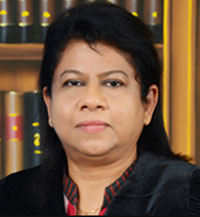News
Communities being encouraged to help manage solid waste
View(s):By D. Thiviyatharshini
There is an increasing need for solid waste management at the community level considering the higher volumes that are disposed of in the country.
“Research shows that by the end of 2025, world cities will generate about 2.2 billion tons of waste, which is three times higher than in 2009,” said Professor Mallika Pinnawala, head of the Sociology Department, Peradeniya University. This highlights the importance of effective waste management, including its social impacts.
According to Prof. Pinnawala, solid waste volumes are rising dramatically. Of which, 75% is degradable, mainly kitchen waste.
Women, as the main figures in the kitchen, significantly contribute to solid waste management informally.

Solid waste volumes of which, 75% is degradable, mainly kitchen waste, are rising dramatically. Pic by M.A. Pushpa Kumara
Most women in the sector are probably invisible. In the informal solid waste management sector, women participate more than men, but receive lower pay for the same tasks, highlighting gender discrimination. Additionally, there is discrimination against sanitary workers, which needs to change.
In the local authority, all the top positions are held by men, while the women are on the frontlines as sweepers and collectors.
Threats to workers arise mainly from ignoring safety gear — removing gloves, masks, and boots while working.
“Recent research shows many sanitary workers face health issues, particularly respiratory diseases like asthma. The working women in this sector are regularly taking alcohol and drugs to get rid of the work pressure,” said Prof. Pinnawala.
Community participation is vital because they are the main source of waste. Their involvement and attitude are crucial, making education and awareness programmes essential. Now, the youth are more involved in volunteering.

Prof. Pinnawala
“In the past two or three years, the government attempted to privatise garbage collection and disposal, but was unsuccessful. In addition, sometimes local authorities collect around 40% of the garbage even in the town areas. Therefore, they are trying to take part from the private sector,” said Prof. Pinnawala.
Waste generators must pay fees for disposal. Kandy Municipal Council charge large hotels for generating over 10 kilos of solid waste daily. This initiative is beneficial. Additionally, there is growing interest in biogas production, encouraging people to get involved.
NGOs play a remarkable role in informal solid waste management.
According to Achini Ilesinghe, project manager, Janathakshan Guarantee Limited, they are working on three projects, including the BLUECAP project, by the Negombo Recycling Club, funded by the World Bank, called the “PLEASE” project. It focuses on empowering informal waste collectors in 15 districts of Sri Lanka.
They set up 15 material recovery facilities, five led by women to empower women and youth. The main centre, Negombo Recycling Club, focuses on producing wood plastic composite. The project will be completed by May this year.
The other project is “PHINLA II” in Ja Ela, Wattala and Chavakachcheri, which is in its second phase, funded by World Vision and Germany. In this phase, Janakthakshan has joined, focusing on low-income and marginalised communities, selecting resource collectors from among them. Janathakshan is not participating in the Chavakacheri area.
They empower women by encouraging them to become resource collectors, with most being women. It will conclude in 2027. This project is similar to the “PLEASE” project. Resource collectors send their materials to medium-level collection centres, called resource banks. From there, resources are distributed to markets for bearing and crushing, and then sent to commercial manufacturers
The third project, launched on February 14, 2025, will run until June 2026 in Kandy, Nuwara Eliya, Matale, and Kurunegala. And the funding support by the Coca-Cola foundation aims to engage women and youth. They plan to have five collection centres across four districts and send resource collectors to these locations.
“We do not call them waste collectors, resource collectors. We have around 400 resource collectors in that project, and our priority is health and safety. We provide thorough training and resources, including personal protective equipment (PPE) kits,’’ said Ms Achini.
Project officers and the evaluation team make random visits to observe and give guidance, especially regarding health and safety, as a part of monitoring.
“The community is focused on keeping the environment clean and addressing the negative impacts of improper waste management. They view this as a social responsibility, rather than a way to earn money.” This shows responsibility.
“Some people we meet during awareness sessions ask if they can start a business with the network.’’
They started community collection clusters through partnerships with women’s organisations and civil society groups. For instance, in the GN division of Arangalai, a society of seniors formed a collection cluster. They gather plastic waste from households at their meeting hall and sell it to a recovery facility. The earnings are then used for welfare activities.
The best way to say that you found the home of your dreams is by finding it on Hitad.lk. We have listings for apartments for sale or rent in Sri Lanka, no matter what locale you're looking for! Whether you live in Colombo, Galle, Kandy, Matara, Jaffna and more - we've got them all!

